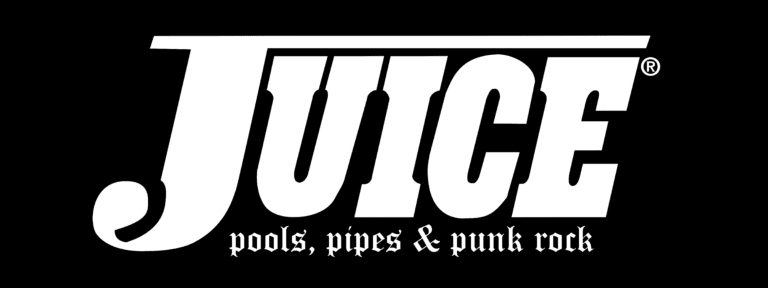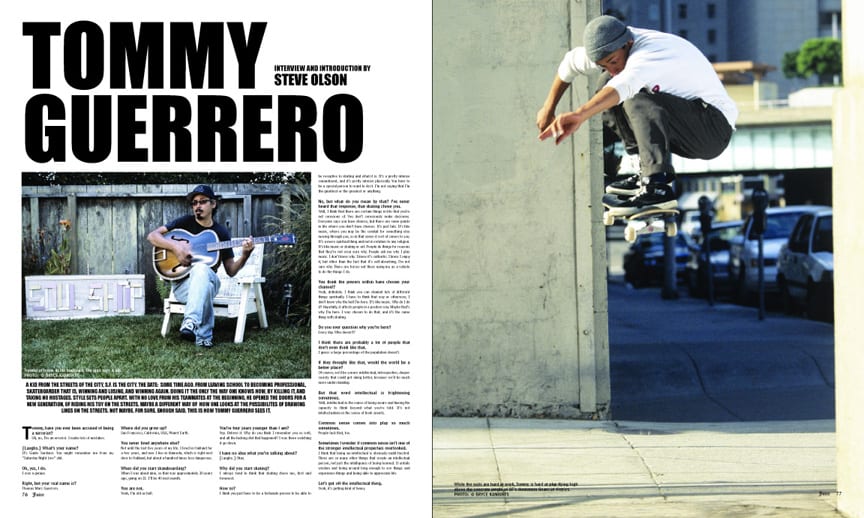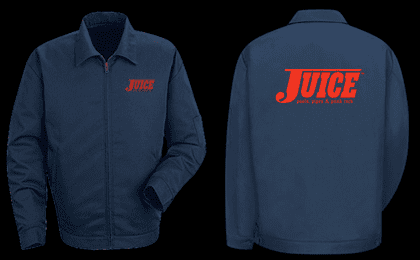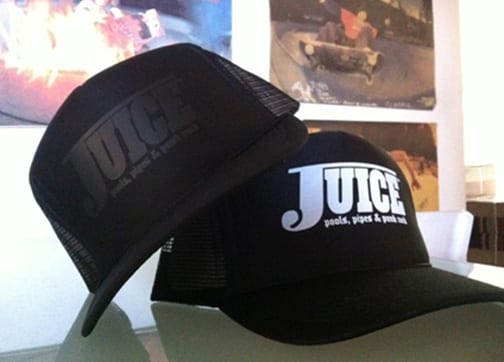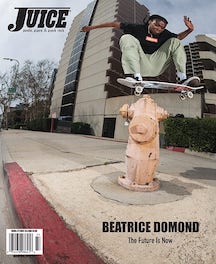INTERVIEW BY STEVE OLSON
INTRODUCTION BY STEVE OLSON
PHOTOS BY BRYCE KANIGHTS
A kid from the streets of the City, S.F. is the city. The date: Some time ago. From leaving school to becoming professional, skateboarder that is, winning and losing, and winning again. Doing it the only the way one knows how, by killing it, and taking no hostages. Style sets people apart. With no love from his teammates at the beginning, he opened the doors for a new generation, of riding his toy on the streets, maybe a different way of how one looks at the possibilities of drawing lines on the streets. Not maybe. For sure. Enough said. This is how Tommy Guerrero sees it.
“I THINK YOU JUST HAVE TO BE A FORTUNATE PERSON TO BE ABLE TO BE RECEPTIVE TO SKATING AND WHAT IT IS. IT’S A PRETTY INTENSE COMMITMENT, AND IT’S PRETTY INTENSE PHYSICALLY. YOU HAVE TO BE A SPECIAL PERSON TO WANT TO DO IT.”
Tommy, have you ever been accused of being a terrorist?
Uh, no, I’m an errorist. I make lots of mistakes.
[Laughs.] What’s your name?
It’s Guido Sarducci. You might remember me from my ‘Saturday Night Live’ skit.
Oh, yes, I do.
I was a genius.
Right, but your real name is?
Thomas Marc Guerrero.
Where did you grow up?
San Francisco, California, USA, Planet Earth.
You never lived anywhere else?
Not until the last five years of my life. I lived in Oakland for a few years, and now I live in Alameda, which is right next door to Oakland, but about a hundred times less dangerous.
When did you start skateboarding?
When I was about nine, so that was approximately 30 years ago, going on 31. I’ll be 40 next month.
You are not.
Yeah, I’m old as hell.
You’re four years younger than I am?
Yep. Believe it. Why do you think I remember you so well? I was there watching it go down.
I have no idea what you’re talking about?
[Laughs.] Okay.
Why did you start skating?
I always tend to think that skating chose me, first and foremost.
How so?
I think you just have to be a fortunate person to be able to be receptive to skating and what it is. It’s a pretty intense commitment, and it’s pretty intense physically. You have to be a special person to want to do it. I’m not saying that I’m the gnarliest or the greatest or anything.
No, but what do you mean by that? I’ve never heard that response, that skating chose you.
Well, I think that there are certain things in life that you’re not conscious of. You don’t consciously make decisions. Everyone says you have choices, but there are some points in life where you don’t have choices. It’s just fate. It’s like music, where you may be the conduit for something else moving through you, so in that sense it sort of comes to you. It’s a more spiritual thing and not in relation to any religion. It’s like music or skating or art. People do things for reasons that they’re not even sure why. People ask me why I play music. I don’t know why. I know it’s cathartic. I know I enjoy it, but other than the fact that it’s self-absorbing, I’m not sure why. There are forces out there using me as a vehicle to do the things I do.
You think the powers within have chosen your channel?
Yeah, definitely. I think you can channel lots of different things spiritually. I have to think that way or otherwise, I don’t know why the hell I’m here. It’s like music. Why do I do it? Hopefully, it affects people in a positive way. Maybe that’s why I’m here. I was chosen to do that, and it’s the same thing with skating.
Do you ever question why you’re here?
Every day. Who doesn’t?
I think there are probably a lot of people that don’t even think like that.
I guess a large percentage of the population doesn’t.
If they thought like that, would the world be a better place?
Of course, we’d be a more intellectual, introspective, deeper society that could get along better, because we’d be much more understanding.
But that word intellectual is frightening sometimes.
Well, intellectual in the sense of being aware and having the capacity to think beyond what you’re told. It’s not intellectualism in the sense of book smarts.
Common sense comes into play so much sometimes.
People lack that, too.
Sometimes I wonder if common sense isn’t one of the stronger intellectual properties overlooked.
I think that being an intellectual is obviously multi-faceted. There are so many other things that create an intellectual person, not just the intelligence of being learned. It entails wisdom and being around long enough to see things and experience things and being able to appreciate life.
Let’s get off the intellectual thing.
Yeah, it’s getting kind of heavy.
No, no. It could get really heavy right now.
[Laughs.]
We’re going to go back to the regular world. How did you start skating?
A friend of mine at school had a Black Knight clay wheels board. He came over after school one day. I lived on a hill on 17th Avenue. As kids we wanted to go down the hill as fast as we could for the sensation. Then he wasn’t really into it, so he gave me that board. That was my first board. I was hooked. That was it. I badgered my mom for so long to try to figure out ways to get me a proper skateboard after that.
Do you remember what year that was?
1975.
In ’75, there were urethane wheels happening.
Yeah, that’s why I was trying to get my mom to get me a proper board. After that happened, I got hooked into the skateboarding magazines, and everything. We went to the Nomad Cyclery. That’s where Fausto and Eric started making Stroker Trucks. That’s how long I’ve known those dudes.
I worked at that shop.
I lived eight blocks away. That’s where I got one of my first skateboards. It was a fiberglass board with urethane wheels. It was a corny board. It had photos of surfers laminated on top of the fiberglass board. It was probably the cheapest board in there. We didn’t really have the means to acquire the good shit yet.
You bought a board from Fausto’s bike shop?
Yeah, at Nomad’s Cyclery, and at the time he had another partner, too. I forget the dude’s name.
Right, and then he bought the guy out.
Yeah. I don’t remember what year he bought the guy out, but that’s where those guys were doing a lot of stuff. I met them when I was nine years old. They used to come to the schoolyard at Jefferson where people skate and set up slalom cones. That was when they had Strokers going.
Strokers were the most functional truck ever made for skateboarding.
They turned like nobody’s business, huh?
Did you ride Strokers?
My brother got a pair of them, so I cruised them around, but I never had my own set.
What did you think of that truck?
Well, back then, weight wasn’t really an issue. We weren’t sliding rails. We did a lot of slalom and schoolyard flatland style stuff. The turning was amazing. You could turn in circles on a dime. I think that we were just progressing so rapidly beyond that. We were doing a lot of freestyle, and they didn’t really work for freestyle. That’s where we were then.
Who did you ride with back then?
I was skating with my brother Tony, Bryce Kanights, Ray Myer, Joe Fong and all of the San Francisco Bay area heads. That’s when Michael Brown, Willie Brown’s son, was skating. We used to go up to his house and skate his ramps. We’d have breakfast with ol’ Willie. We had a whole crew of friends up there like Monty and Marlon. It was cool.
How was it growing up in San Francisco? It’s kind of a natural skatepark.
It was home. You just adapt to your surroundings. Everybody that would come here couldn’t hang with the hills, because they weren’t from this type of environment. Growing up here, you just learned to skate them.
Were you the King of the Avenues?
I was never the king of nothing.
Oh, c’mon. Don’t be modest.
There were a lot of cats and we all skated the hills. Nobody was king of anything. Everyone ripped them.
I just remember hearing that Tommy G owns the Avenues.
[Laughs.]
The modest thing is out. Now we’re going to get into bragging.
There was the 9th Avenue run. You’d take the bus up to the top of a mile and a half of hills. Tons of us would do it. There would be 20 kids going to the top of the hills. Everybody was just cruising down them. My thing was, later, I adapted the ollie to that kind of stuff.
There you go.
Other people did, too. When the forward ollie in motion came around, that’s when it really changed everything. We were going up the curb and over the bush. It became utilitarian. It was like, ‘Oh, that’s in my way. I’ll go over it.’
When did that happen?
Well, I don’t know. It was the early ’80s.
Was it the early or mid ’80s?
It was the early ’80s. 1985 was when I turned pro, and I’d already been cracking ollies up curbs for years before that. I had ollied to axle on stairs in ’82 or ’83. I remember having certain boards and being able to ollie up curbs. We were definitely flying down hills by ’84. It might have been ’83. It was before I turned pro. I’m terrible with dates. I’m lucky to even know what year I was born.
What was it like growing up in San Francisco as a kid?
It’s difficult to say. It’s somewhere I lived all my life. I was just being a kid. Me and my brother and my mom would always live in the Avenues, because my mom tried to keep us out of the ‘hoods. We grew up in the inner Sunset, and there was a lot of skating going down. We’d also go skate downtown. On the way downtown, you’d encounter all kinds of shit, so we learned to take care of ourselves. We learned to look over our shoulders. We knew what neighborhoods to avoid. We knew which ones you could skate through.
You became street smart whether you wanted to or not?
We had no choice. It was instinct and survival.
Survival of the fittest.
Yeah, that’s it. Do you know what I mean?
Yeah, I do. I didn’t grow up like that, so I didn’t experience that, but later on, yeah.
Well, when I first got in high school, being a skater and a punker with bleached hair didn’t really fly with most people. I got a lot of grief in school. That’s why I dropped out.
What year did you drop out?
I was around 15. I went back when I was 16 to try another semester, but I decided it really wasn’t for me.
So you bailed in 10th grade?
Yeah. I’m not telling anyone to do that, by any means.
No, you’re not. So why did you bail from school? I bailed from school as well, so it’s not a judgment thing.
I couldn’t handle the whole deal. The cliques were very intense. You had all of these different groups of kids and being the person that I was, I didn’t fit into any one of these cliques in any way shape or form. I saw how the teachers didn’t care. I had one teacher that gave a shit and he was the art teacher. He let me do whatever I wanted and made everyone else do assignments. It was awesome. Other than that, all of the other teachers didn’t give a shit. It just dawned on me that I would probably be better off not being there. I was really small back then, so I was going to probably get the shit beat out of me for the rest of high school. Everyone thought I shouldn’t even be in high school, because I looked like I was about 10. It was just one of those things. I decided I didn’t want to deal with that anymore. I had stopped going for a while before I finally told my mom. When we finally spoke about it, she threw up her hands as if she didn’t know what to do. She worked full time. I’d been on my own since I was five. I was taking myself to kindergarten. She knew that I was not a stupid person. I was skateboarding constantly. I was staying out of trouble. I never got into trouble as a kid. I was skating 24-7. She knew that was a really positive thing, so she made sure that me and my brother always had skateboards somehow.
That’s nice.
Yeah, my mom has always been super supportive of everything that I’ve done.
So skateboarding saved your life?
Yeah, completely. It’s still saving it, even though I don’t even get to skate anymore.
Why not?
Well, I’m sitting here in front of the computer monitor trying to finish a catalog right now. I’m working all the time. The other reason is my home life and my family. I also have a music life that’s my priority after my work here at Deluxe. That doesn’t leave enough time to do the things that I’m obligated to do. Skating has now taken a backseat.
You have kids?
I have a two-year-old son. His name is Diego Redcloud Guerrero. He’s a really cool kid.
Excellent. You must be psyched. I didn’t even know you were married.
Yeah, I’m a family man. It’s awesome.
So you’re living in San Francisco and skating. How did you first get sponsored?
My first sponsor was a skate shop sponsor. Cal Precision was the skate shop that we all lurked out at. They had little tryouts for the team. The first time, I didn’t make it. I was bummed. I was only nine years old. The next time around, I made it. We got discounts on stuff in the shop. That was my first sponsor. From there, my next sponsor was Alot-A-Flex.
You did not ride for Alot-A-Flex.
Yeah, it was me, my brother, Jeff Sands, Tim Marting, Paco Prieto and the Fisher brothers. They were all amazing skaters and talented people in general. That was a cool time. Those guys taught me a lot about life. Dave Fisher was the one that always looked after me. I remember riding around in his VW and listening to Pink Floyd and The Animals when I was 11.
Wasn’t Alot-A-Flex out of Berkeley?
Yeah. We’d hop BART, go to Berkeley and skate with those dudes. When Alameda had the first skatepark around here, we’d go skate there. That was our local skate park.
Did you session other parks in the Bay area?
Yeah, when the other parks came around, Milpitas was our skatepark.
Did you skate Campbell and Winchester?
Yeah, we went to Campbell and Winchester, but we were stoked on Milpitas because it was more well-rounded. It had a lot more to skate, whereas Winchester only had a few things. They had the small egg pool, which was great, the keyhole, of course, and the washboard. For the most part, everything else was a wash.
You didn’t like the halfpipe at 50 mph?
That thing just sucked.
And you didn’t like Wolfman?
Wolfman was all right. I got along with dudes like Kiwi, and all of those cats. I was just a little kid and a skater, so they were stoked. They were like, ‘Look at this little kid.’
Did you have the attitude of Nor Cal in So Cal when you were a little kid, too?
No, not even. I wasn’t even aware. So Cal was in the magazines, so I had dreamed of going there, but I was too young and had no money. My brother went down there with some friends on a road trip. He brought me back some stickers. I think I still have them.
Why do you skateboard like a surfer?
I don’t know. I’ve been told that for a long time, even by surfers. The funny thing about is that I can’t even swim. I can’t swim, so I’ve never even tried to surf. I’ve never snowboarded either.
Are you afraid of the water?
Yes, I do have a phobia of water. With the ocean, you have to have some cajones.
You’ve never surfed, but you skate almost like you’re a surfer.
Yeah, I don’t know. I like to be in touch with stuff around me, so I know where I am. I like to be in touch with the ground, terra firma. That’s part of it.
What was it like when you got your first picture in a magazine? Were you hyped out of your mind?
Yeah. I think one of the first real photos that I got was the cover of ‘Thrasher.’ It was during my transition between Madrid and Powell. I was just starting to ride for Powell. I must have had photos before that, but I can’t remember what though. I was beyond stoked. I think that you’re not aware, but you feel validated in that sense.
It gives you that sense that you made something happen.
Exactly.
FOR THE REST OF THE STORY, ORDER ISSUE #61 BY CLICKING HERE…
SHARE THIS POST:
- Click to email a link to a friend (Opens in new window)
- Click to share on Tumblr (Opens in new window)
- Click to share on LinkedIn (Opens in new window)
- Click to share on Pinterest (Opens in new window)
- Click to share on Twitter (Opens in new window)
- Click to share on Facebook (Opens in new window)
- Click to share on Reddit (Opens in new window)
- Click to print (Opens in new window)
